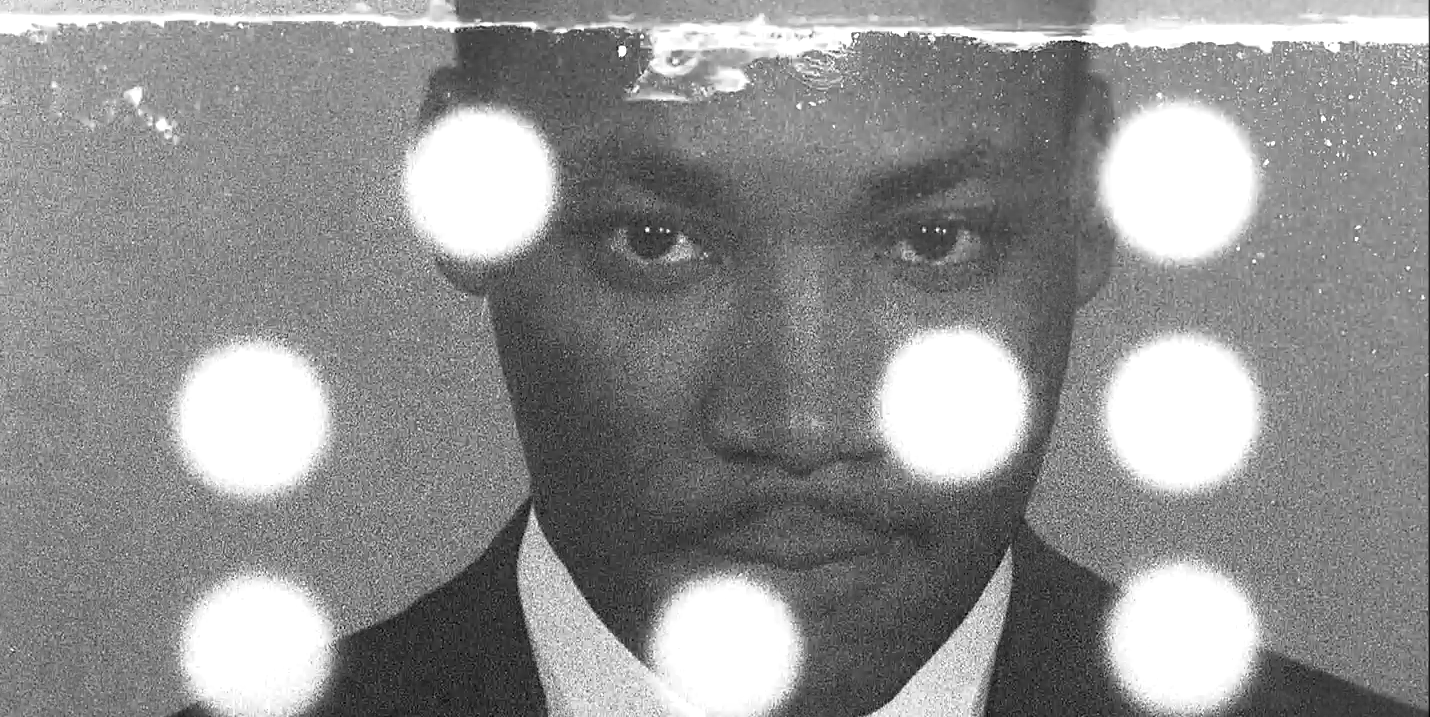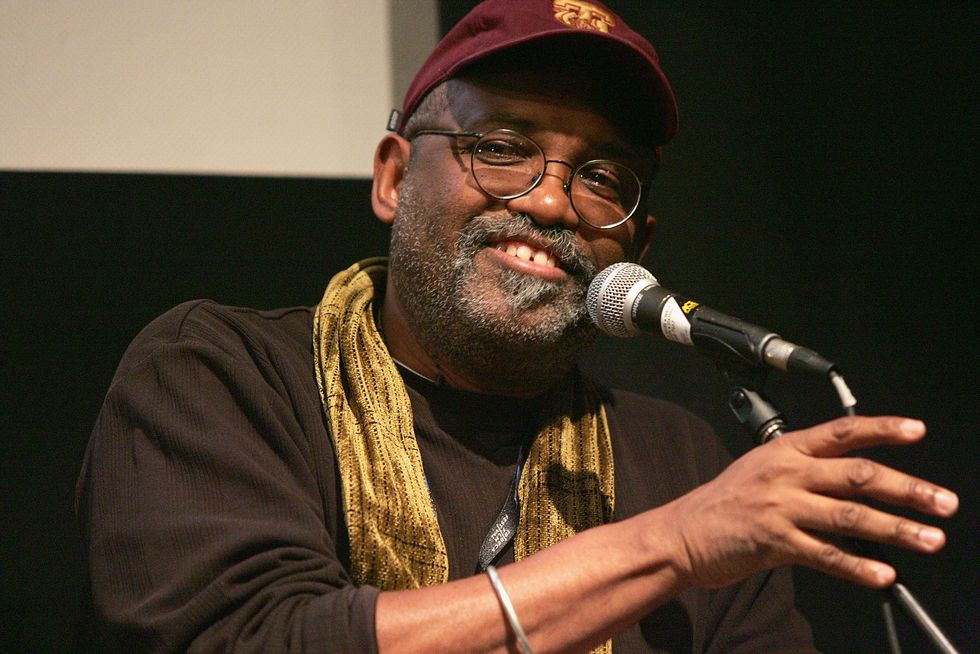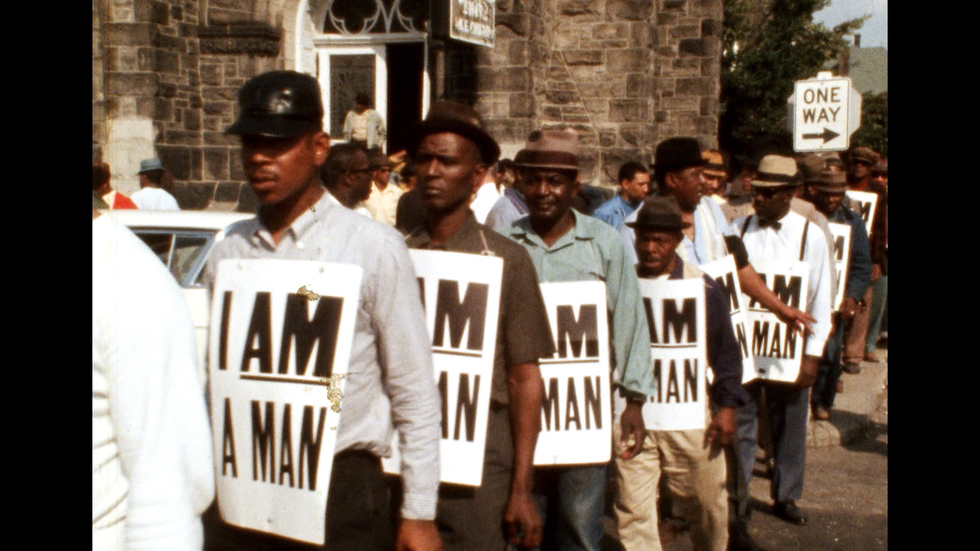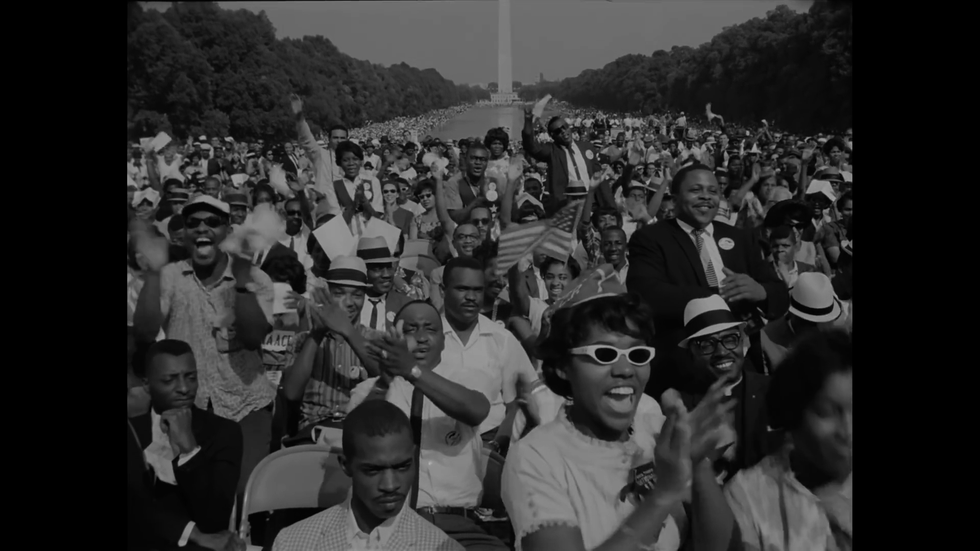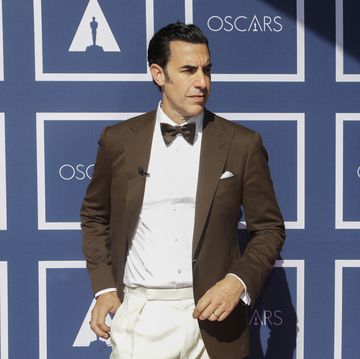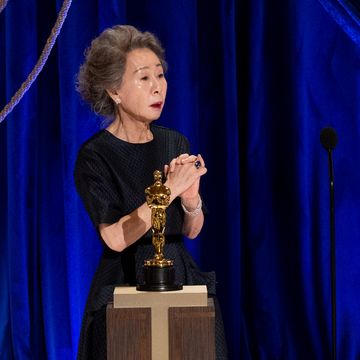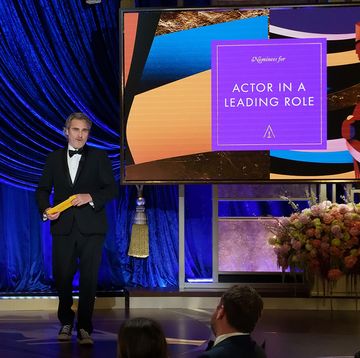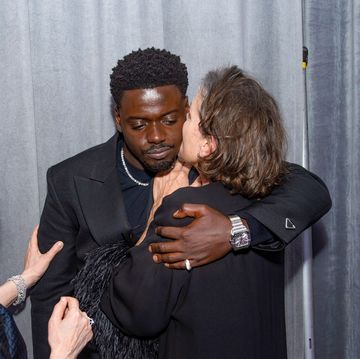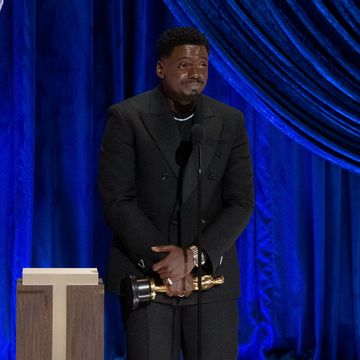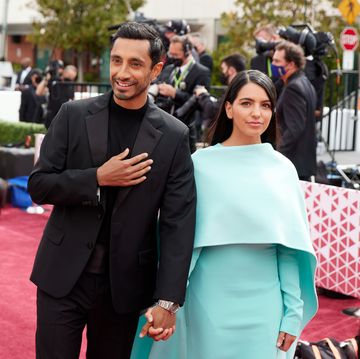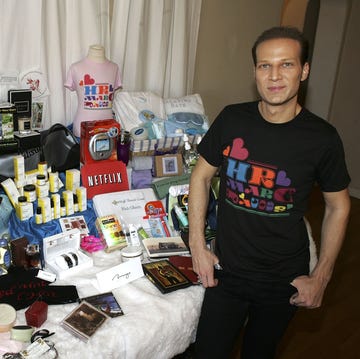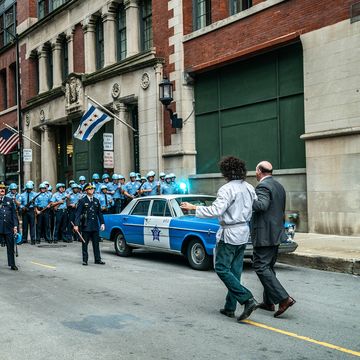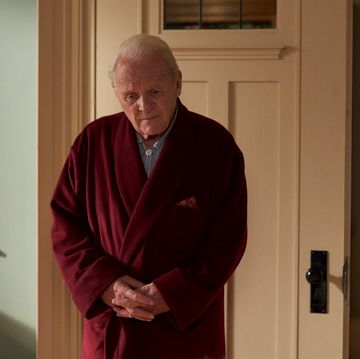The hour in which documentarian Sam Pollard jumps on Zoom with Esquire turns out to be a thrillingly and misleadingly upbeat sliver of time. Democrat Raphael Warnock has won his Senate run-off and fellow Democrat Jon Ossoff looks very likely to follow him.
"Wow," says Pollard in New York. "Well, now Mitch McConnell will really get nervous. But imagine today, with this certification thing in Congress…"
About an hour later the President will invite his supporters to storm the Capitol, and about three hours later they will be waving Trump flags from the Speaker’s chair, stealing lecterns bearing the State seal and posing in Nancy Pelosi’s office chair. It was nice while it lasted.
There’s never been a time when Martin Luther King hasn't been relevant, but the protest, mistrust and bad faith flowing around America over the last year has made Pollard’s new documentary, MLK/FBI, even more pertinent. Using recently declassified documents, it tells the story of King’s rise and impact in tandem with the looming shadow of the FBI beginning its campaign of harassment and wire-tapping, and its attempts to smear and intimidate King into abandoning his principles. The actual tapes which the FBI took while surveilling King are still a largely unknown quantity; they will remain sealed until 2027.
"A lot of the stuff we were looking at and dealing with in this film continues to plague America – I use that word, ‘plague’," Pollard says. "Systemic racism, the notion of how the American notion of democracy sometimes doesn’t mean that Black people and people of colour should be included in it."
Pollard earned a Peabody Award for his work on Spike Lee's When the Levees Broke, and after making films about Sammy Davis Jr, Marvin Gaye, August Wilson and John Wayne, he's realised the he keeps getting drawn into his own past. Having grown up witnessing the slow advance of the civil rights movement in the Fifties and Sixties, he's seen the kind of mud now being slung at activists before.
"The notion that King was going to be, you know, connected to the Communist party – you’re still hearing that today in America," he says. "The notion that these peaceful protests that King did in the Sixties was going to cause riots in the streets, the notion that Black people are moving too fast. You’re still hearing that kind of dialogue today."
What cliches about Dr King did you want to avoid or challenge?
I think the two things that we wanted to avoid was trying to make just a hagiography of Dr King. That was something we definitely wanted to avoid. The other thing we wanted to avoid from an aesthetic perspective was we wanted to make sure our audience to could get immersed in the archival material. That was why we came up with the decision not to have anybody on camera. To keep people engaged in the footage. So you may wonder who’s talking, but [it would] keep you immersed in the footage. So that was the two parts of our agenda.
Did anything you found in the archive surprise you?
Yeah – I was surprised to see that material of King with his family, his wife and his kids and his parents when the kids were young, playing. I was surprised to see some stills of King playing baseball with his son in the backyard, and at the dinner table. I hadn’t seen those images before. I was surprised to see images of Scotland Yard having arrested James Earl Ray. That was material I’d never seen before. I thought, because I’ve done a lot of these films about the civil rights movement, that I had seen everything, you know? But that’s what happens when you hire a great archival producer. They unearthed material that even I hadn’t seen before.
How far do you think the modern remembrance of Martin Luther King is from the reality of the man?
There's streets named after King, there’s schools named after King, there’s a King holiday. Think about it like, when I grew up in the Sixties, there were two iconic figures in American history that we were taught about in school. The first was George Washington, and that he what, never cut down a cherry tree? And Abraham Lincoln, the great emancipator. That’s all I knew! That’s all we were told. It took years for us to know that there was much more nuance and complex perspectives on both these men. So most people when you say Martin Luther King, they think oh yeah, the great holiday in January, and that he was the guy who did the ‘I have a dream’ speech. That’s how most people remember him. It’s only when you dig into his life, you see he was a much more complex human being.
I think what we tried to do in this film is show that like all of us he was a man who had his flaws. Think about this: he goes to the White House, right before the March on Washington, he’s confronted by John F Kennedy and Bobby Kennedy and basically told, ‘We know that you have a relationship with Stanley Levinson who we think was a member of the Communist Party and may still be a member of the Communist Party. You should disassociate yourself from that man who could be harmful to you and the civil rights movement.’ Now, what does Dr King say to the face of Bobby and John Kennedy? He says, ‘Yes I will,’ or something to that effect. But does he really? No. No! He doesn’t. He distances himself from some other people, but not Stanley Levinson.
Here’s a man who, like many of us, was multi-tasking: he’s the leader of the civil rights movement, he’s a man who’s having extramarital affairs, he’s a man who’s understanding that he’s being wire-tapped by the FBI 24/7. Here’s a man who by 1967 decides –what his constituency probably feels is a wrong move – he comes out against the war in Vietnam, knowing full well that’s going to sever his relationship with one of his closest allies from the government, Lyndon Baines Johnson. I mean, this is a guy who had a real complicated life.
You grew up in the Fifties and Sixties. What was your first awareness of Dr King?
My first awareness was that he was the guy who said the ‘I have a dream’ speech at the March on Washington. I was 13 years old – it was like, ‘Wooow’. And then a few months later I’m in middle school and my teacher comes in on November 22 1963 and says, "School will be closed today students, because our President has been shot in Dallas, Texas." I couldn’t believe it, man. I was like, how could this happen in America? And then you fast forward to five years later, I’d just turned 18 – April 2 1968. Two days later I’m at home and the news comes on, Walter Kronkite – remember Walter Kronkite? – on the evening news saying, "Tonight, Dr Martin Luther King was shot in Memphis, Tennessee, at the Lorraine Motel." It was like, what? In my household, like in many African-American households, we had three pictures on our walls: Martin Luther King, John F Kennedy, and Jesus Christ. That tells you what we thought of him back them. What I thought of him back then.
How did your perspective start to change?
I’d say it started to change by the Eighties and Nineties. I’d been in the film business almost 20 years, and you know, like a lot of us, as I began to mature and read more books and had a deeper analysis about every human being I’d sort of mythologised, I started to see him from a different perspective. Listen, man, I grew up thinking John Wayne was one of the greatest Americans of all time. I watched all those Westerns, I understood the notion that the American cowboy myth was what made America great. I mean, come on! It’s like you growing up with the Empire. I grew up watching those films like you’d watch Gunga Din and Lives of a Bengal Lancer. I’m telling you man, it’s amazing how you can be brainwashed to such a degree, and the work you have to do as a human being to understand: ‘Uh oh! There’s another way to look at how these worlds have been shaped and created.’
That’s another theme in MLK/FBI, how the myth of the FBI was built by film and TV. Did you soak that up to?
Absolutely. I was the one who suggested it – I think it was the second day in the edit room, I said to Laura Tomaselli, who did the editing of the film, I said, "Laura, I’m gonna come in with a list of films that you need to find, because this will give you a sense of the mythology of the FBI that we need to seed in throughout this film." So I went home and came up with my list. I had seen every one of these films, you know: Walk A Crooked Mile, Big Jim McClane with John Wayne, The FBI Story with Jimmy Stewart, The FBI series with Efrem Zimbalist Jr. I mean, the mythology of the FBI was that they were the good guys thwarting evil, killing people like John Dillinger. They were G-Men, America’s police force, doing the right thing all the time. It took me til years later to understand that they didn’t do anything when [James] Chaney, [Andrew] Goodman and [Michael] Schwerner were killed in Mississippi, you know? [The three civil rights workers were abducted and murdered by white supremacists in June 1964.] They had to have themselves be pressured to really investigate King’s death. I mean, the FBI may be America’s police force, but not in such positive ways.
Do you have much more faith in the rule of law in the States now?
You know, I… I question every lawyer I’ve ever interviewed: why do you really believe that there’s a rule of law? Do you really buy into that notion? I’m real cynical now. Let’s see how stuff plays out today in Congress. Everybody’s saying there’ll be a lot of huff and puff but no blowing your house down. Let’s see. Let’s see what Pence does. Let’s see what Ted Cruz and Josh Hawley do today. I mean, can all these 100 and something house of representatives say that this president elect is illegitimate? It’s crazy man, it’s crazy.
Trump doesn’t believe in the rule of law. He has no care of the rule of law. It’s all about I, I, I, I, I. He doesn’t care about his own base, really, from my perspective. They don’t believe that, but I believe it. He doesn’t care! Since the election, has the president of the United States focused on anything except his need to feel he’s been undermined and that he deserved to win the election? Has he been concerned about the pandemic, about the vaccinations? Has he really been concerned about the American people? No! But what’s so interesting about the world is there’s obviously 70-something million people who believe what he says. That alone frightens me.
As one of your interviewees says, the civil rights struggle is very recent history, but sadly eye-witnesses to it are dwindling. Is there anyone you wish you could have spoken to for their perspective?
I would have liked to talk to [civil rights activist and very close friend of King] Ralph Abernathy. You know that Abernathy must have had some real secrets that he kept close to the vest about King, about their relationship. People like [pastor, civil rights leader and cultural historian] Wyatt Tee Walker, who was also one of King’s closest lieutenants. It would have been interesting to talk to some of those people. [Civil rights activist] Dorothy Cotton as well, who as you know was not only one of his closest confidants but also one of his supposed lovers.
The film closes on the question of what to do with the sealed tapes of FBI intelligence on King. Do you have any hunches on what might be on them, based on what your interviewees have said, and do you have a sense of what we ought to do with them?
Some of the people in the film – specifically the former FBI agent Chuck Knox – felt that the tapes shouldn’t be released, that they’ll be of no service to anyone. I have the opposite reaction. I don’t have an issue with the tapes being released, because besides the material that people will find salacious, I think what you’ll also hear on those tapes, hopefully, is Dr King’s conversations with people like Abernathy and Clarence Jones and Andy Young and others, basically talking about their strategies in these different cities they were in. In Birmingham, Alabama, in Albany, Georgia, in Chicago. What were the strategies they were going to try to undertake to break the back of segregation? So I’d be interested in hearing those conversations if they exist on those tapes.
MLK/FBI is out now on digital platforms
Like this article? Sign up to our newsletter to get more articles like this delivered straight to your inbox
Need some positivity right now? Subscribe to Esquire now for a hit of style, fitness, culture and advice from the experts
